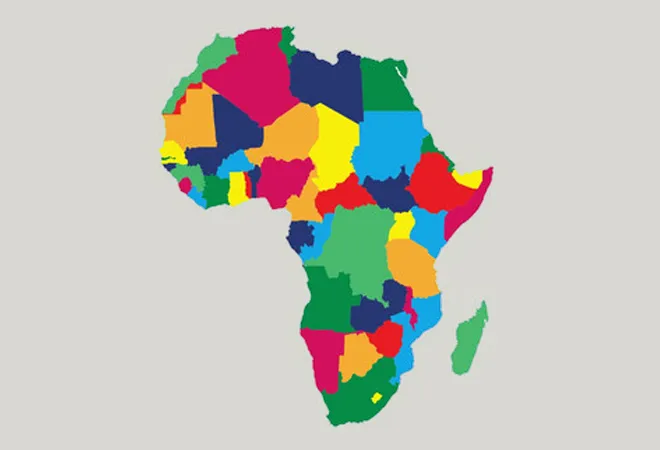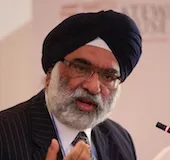-
CENTRES
Progammes & Centres
Location
India’s G20 presidency provides it a chance to reboot its ties with African nations

India’s G20 presidency has the potential to give India's Africa policy a further fillip. A refurbished Africa policy will burnish the G20 Presidency with India as the voice of the Global South (VOGS).
During the Modi years, the successful India-Africa Forum Summit (IAFS III) with the participation of all 54 African countries, started revitalising the Africa policy. Modi’s visits to Africa in 2016 and 2018 and the enunciation of the 10 principles for Africa in Uganda in 2018 were important initiatives. These require a post-pandemic and post-Ukraine crisis reassessment. Signs of this are visible, with the External Affairs Minister (EAM) visiting Uganda and Mozambique. When in South Africa for the BRICS ministers meeting, he will have the opportunity to visit other African countries.
Since India is the voice of the Global South, speaking up for Africa, in particular, is important. Africa suffered deeply from the consequences of the pandemic and the Ukraine conflict. The participation of African countries in the VOGS summit showed their expectations and the potential for the fulfilment of the said expectations through India’s G20 presidency.
How to expand India’s Africa policy?
What can India strategically do during its presidency and beyond to further its extant Africa policy?
First, India should hold IAFS IV before the G20 summit. This has been pending for some time and was delayed from 2020 due to the pandemic and due to other pending summits with the African Union (AU). Now if IAFS IV is held expeditiously, it will enhance India's stature as representing the Global South, particularly Africa at the G20. Since 2021, the US-Africa Leaders’ Summit, the Forum on China-Africa Cooperation, the Europe-Africa Summit, the Tokyo International Conference on African Development were held. The Russia-Africa Summit is scheduled for July 2023.The opportunity to hold IAFS IV after the G20 Summit will diminish since 2024 is election year in India.
Africa realises there is considerable time before it gets a seat on the United Nations Security Council (UNSC) on a permanent basis, and therefore aspires to be recognised by the G20.
Secondly, India should endeavour to have the African Union included as the 21st member of the G20 and upgrade it from a permanent invitee to a member. The AU adopted a decision at the AU summit in February 2023 to canvas for its place in the G20. Africa realises there is considerable time before it gets a seat on the United Nations Security Council (UNSC) on a permanent basis, and therefore aspires to be recognised by the G20. At present, both the African Union Commission and the African Union New Partnership for Africa's Development (AU-NEPAD) are permanent invitees and South Africa is the lone African Country in the G20. The AU-NEPAD invitation was specially created when NEPAD was a separate entity. Since it is now integrated as the AU Development Agency (AUDA), the logic would be to make the AU the 21st member and remove AU-NEPAD from the list of invitees.
Representation of Africa in international fora is a consistent battle. For decades, India has fought for Africa's place on international high tables and supported African countries’ entry at Bandung, into the United Nations, the World Trade Oraganisation and other agencies. Building a consensus on the AU will expend diplomatic capital as other contestants will jostle as well, but India could carry the day for Africa.
Even a BRICS expansion is being attempted. India should champion African countries to join BRICS whenever an expansion takes place. At present, South Africa is the only African country within G20 and BRICS. Since the limitations on expansion of G20 exist, the BRICS could be a good alternative to support individual countries like Nigeria, Egypt, and Kenya. Nigeria and Egypt besides Mauritius are the African countries that India has invited as its guests to the G20. This will also help in preventing BRICS expansion from becoming a China-led exercise.
India is implementing the Indo-Pacific policy through Security and Growth for All in the Region (SAGAR) and the Indo-Pacific Oceans Initiative (IPOI) with diligence and regular pursuit. It is important that Africa is integrated into India's Indo-Pacific policy, and cooperation under IPOI should be introduced into relations with countries on the Indian Ocean littoral. India has bilateral strategic relations with Mauritius, Seychelles, Madagascar, Mozambique, and others but a more comprehensive and consistent engagement of a strategic nature with countries on the Indian Ocean and Red Sea littoral is important. This will also help to refocus India's Africa policy on countries of strategic interest to India. Through this strategic focus, India should then put its development cooperation, private sector FDI, and other forms of cooperation into play so that a closer engagement with these countries can emerge.
India is implementing the Indo-Pacific policy through Security and Growth for All in the Region (SAGAR) and the Indo-Pacific Oceans Initiative (IPOI) with diligence and regular pursuit.
India recently held the second edition of AFINDEX, the India-Africa military exercise with 20 countries. It also held for the first time the conclave of Army Chiefs of Staff. AFINDEX is acquiring a stature and growing slowly; however, it needs more cohesion. Countries with which India has strategic ties, must participate in it. The absence of Mauritius and Mozambique, for instance, from AFINDEX was notable and should be amended in the next edition. Similarly, the Chiefs of Staff conclave needs more strategic heft. Countries with which India wants to develop a relationship should participate at appropriate levels and not from their embassies or absent themselves. With 18 new missions in Africa, India should exercise greater diplomatic clout.
This approach is enhanced by the 22 ministers attending India Africa Defence Ministers Meeting in 2022 and the 26 ministers who attended the Indian Ocean Defence Ministers meeting held alongside the DEFEXPO in 2021. It is certainly not easy to bring so many ministers to India at one time, but there is a definite method required so that particular countries with whom India wishes to develop a relationship participate with certainty.
There is also the requirement of finding new and wider markets for India's defence exports. Relationships can be built with countries where Indian military teams have been active, where India has helped in building training facilities, and where Indian troops have participated in peacekeeping missions. This is the large catchment that must be tapped.
The Indian Ocean Rim Association (IORA) is a natural arena where India has engaged with countries on the Indian Ocean littoral in Africa. India should encourage countries such as Tanzania, Kenya, and Mozambique to seek the chairmanship of IORA because other than South Africa none of the nine African countries who are IORA members have ever chaired the Mauritius-based organisation. India should offer to assist a country which volunteers to chair IORA, for its preparation, engagement, and success.
It is evident that crisis situations in Africa and other places keep occurring, as seen recently in Sudan. India needs to have strategic engagement with countries in the region so that evacuations and Humanitarian Assistance and Disaster Relief (HADR) can both be undertaken effectively because cyclones and other natural calamities are a recurring problem too. In the past, India has used Djibouti as a base to evacuate people from Yemen; during the Sudan evacuation, Jeddah in Saudi Arabia was the preferred staging post. Expanding partnerships with Regional Economic Communities (REC) facing the Indian Ocean like Southern African Development Community (SADC), East African Community (EAC), and the Intergovernmental Authority on Development (IGAD) will help develop their policies with strategic intent.
Relationships can be built with countries where Indian military teams have been active, where India has helped in building training facilities, and where Indian troops have participated in peacekeeping missions.
The Horn of Africa is in a deeply cleaved situation where not only the big powers but regional powers are playing a divisive role. Crisis in this region is always on the horizon. Preparing for evacuations and humanitarian assistance is a benign and defensive vision, but given India’s stature in the Global South and its strategic autonomy, it could perhaps engage the countries of the Horn of Africa further and play a stabilising role in conjunction with other friends. At present, this appears extremely difficult but requires attention and effort. A practical effort to support African wish to ‘Silence the Guns’ is necessary even at Track-2 level. India could consider appointing a Special Envoy for the Horn of Africa to use its good offices and enhance India’s partnership,
India's renewed effort to engage with the Non-Alignment Movement, is welcome, with Uganda currently chairing the forum. This is a sign that India is going to reengage with institutions of the Global South and support and guide them wherever necessary. At the same time, India is seeking to continue efforts to reform theUN, including theUNSC. In this, the support of Africa is vital. Can India work with Africa with greater confidence to get them to move from the Common African Position or the Ezulwini consensus into a more productive outcome? This may create a better chance for African countries finding representation in the UNSC. There has to be a realisation that the Ezulwini consensus is now becoming a shackle on African ambitions besides preventing building of effective coalitions with other members of the Global South.
Finally, as the AU matures, it’s time for India to engage its new agencies. The Africa Continental Free Trade Area is in motion. India can provide technical expertise and support to it and the RECs to improve its implementation. Similarly, the upgrading of the Africa Centre for Disease Control (Africa CDC) to an AU agency must be noted. India is the largest supplier of pharmaceuticals and vaccines to Africa This can be raised to an effective partnership by engaging with the CDC and the newly emerging African Medicines Agency.
Gurjit Singh is India’s former ambassador to Germany, Indonesia, Ethiopia, ASEAN and the African Union.
The views expressed above belong to the author(s). ORF research and analyses now available on Telegram! Click here to access our curated content — blogs, longforms and interviews.

Gurjit Singh has served as Indias ambassador to Germany Indonesia Ethiopia ASEAN and the African Union. He is the Chair of CII Task Force on ...
Read More +